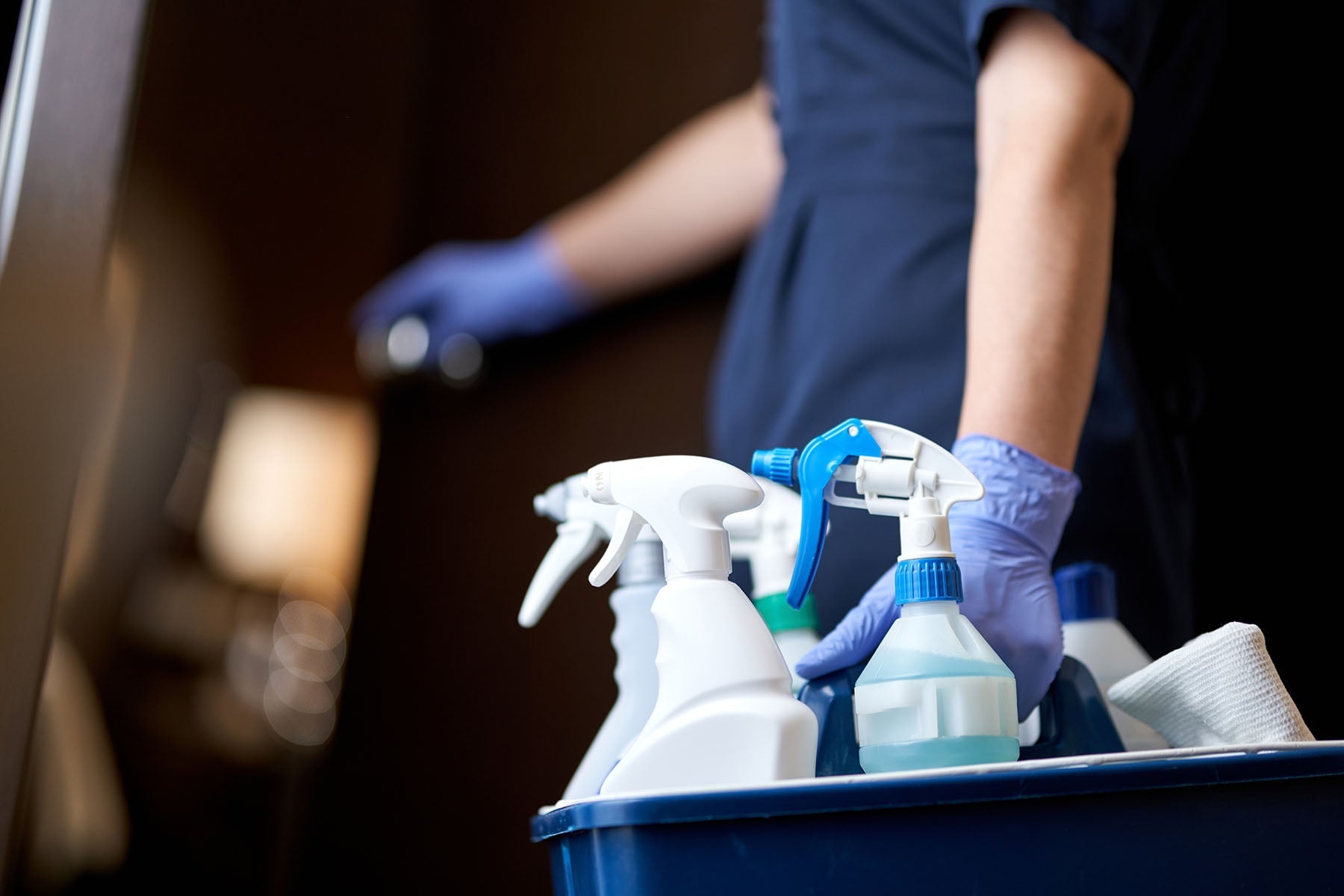
Guidelines for the Safe Use of Cleaning Chemicals
Handling cleaning chemicals safely is an essential part of professional cleaning.
Housekeepers are exposed to a range of products that, while excellent at cleaning, are dangerous if used incorrectly. Irritants, dangerous fumes and volatile chemicals mean that cleaning professionals need a solid understanding of the products they’re using.
The importance of workplace safety cannot be overstated. Properly handling and using cleaning chemicals minimises the risk of accidents and contributes to the overall productivity and professional standards of cleaning services.
Before using any cleaning chemicals, it is essential to carefully read and adhere to the manufacturer’s instructions provided on the product packaging and on the product Safety Data Sheet. Failure to do so could lead to unintended consequences, including damage to surfaces, health risks, or inefficient cleaning. The instructions outline proper usage, dilution ratios, safety precautions, and compatibility with different materials.
Essential Safety Equipment for Handling Cleaning Chemicals
Gloves: These provide a protective layer that prevents direct contact with cleaning chemicals, reducing the risk of skin irritation and burns. Ensure the gloves used are chemical-resistant.
Eyes Protection: Eyes are extremely sensitive to chemicals. Goggles provide protection from splashes, fumes, and direct contact with chemicals.
Respirator Masks: Certain cleaning chemicals may release toxic fumes. A respirator mask filters out these fumes and protects your lungs from potential damage.
Coveralls or Apron: Chemical-resistant clothing protects your skin from spills and splashes from potentially corrosive chemicals.
Safety Footwear: Chemical spills can damage your feet or cause slipping. Safety footwear is often resistant to chemical penetration and has slip-resistant soles for added safety.
Safety Data Sheet (SDS): This document provides information on a chemical product's hazards and advises on safety precautions. It's important to have easy access to it whenever handling the corresponding chemical.
Best Practices When Using Cleaning Chemicals
Use the Safety Data Sheet (SDS): Each chemical product has an associated SDS, which contains detailed information about the chemical, its hazards, and how to handle it safely. Reading and understanding this information before use ensures you are prepared to handle the product.
Always Wear Personal Protective Equipment (PPE): Appropriate PPE such as gloves, goggles, respirator masks, and coveralls are crucial in protecting yourself from harmful chemical exposure.
Never Mix Cleaning Products: Different cleaning chemicals can react adversely when mixed together, potentially creating toxic fumes. Always use cleaning products individually unless the manufacturer's instructions specify otherwise.
Use Appropriate Ventilation: Many cleaning chemicals produce fumes that can be harmful if inhaled in large amounts. Always use these products in well-ventilated areas to minimise inhalation risk.
Store Chemicals Safely: When not used, cleaning chemicals should be stored in a safe, cool, and dry environment, away from incompatible substances. They should be kept in their original containers with the labels clearly visible.
Proper Disposal of Chemicals: Never pour unused or unwanted chemicals down the drain unless specifically directed. Instead, follow the manufacturer's guidelines or local waste regulations for safe disposal.
Regularly Maintain and Inspect PPE: Check for any signs of wear or damage to ensure your PPE remains effective. Replace any items that show signs of deterioration immediately.
Attend Regular Training: Safety procedures and recommendations can change over time, so keeping up-to-date with the latest best practices and training is important.
Remember, using cleaning chemicals responsibly ensures your safety and the safety of others in the vicinity and the environment. Following these best practices will help cleaning professionals maintain a high safety standard while performing their duties.
Ensuring Safety When Handling Cleaning Chemicals
Always:
Wear PPE: Your first line of defence against potential hazards, PPE should always be worn when handling cleaning chemicals.
Work in Well-Ventilated Areas: Adequate ventilation reduces the risk of inhaling toxic fumes from cleaning products.
Store Chemicals Properly: Each chemical requires specific storage conditions. Always adhere to these to prevent damage or harmful reactions.
Follow Manufacturer's Instructions: These instructions provide the most accurate guidance for safely using the product.
Dispose of Chemicals Correctly: Improper disposal can harm the environment and pose health risks. Always follow the manufacturer's or local waste regulations.
Never:
Mix Cleaning Chemicals: Unless specifically instructed by the manufacturer, never mix different chemicals - there’s a high risk of creating toxic fumes or other harmful reactions.
Ignore Warnings or Precautions: The information provided on labels and in SDS is there for your safety. Ignoring it can lead to serious accidents.
Use Damaged or Leaking Containers: Using chemicals from a damaged or leaking container can lead to chemical exposure or spills. Always replace or properly dispose of these containers.
Remove PPE Until the Task is Complete: Removing protective equipment prematurely exposes you to potential risks.
Dispose of Chemicals Improperly: Improper disposal can cause environmental damage and pose a risk to public health.
Always follow the manufacturer’s instructions provided on the product packaging and on the Safety Data Sheet when handling, using, and disposing of any cleaning product.
Explore Our Range
High-quality housekeeping services need high-quality cleaning chemicals. Our essential range of materials ensures your housekeepers get the perfect clean every time.

